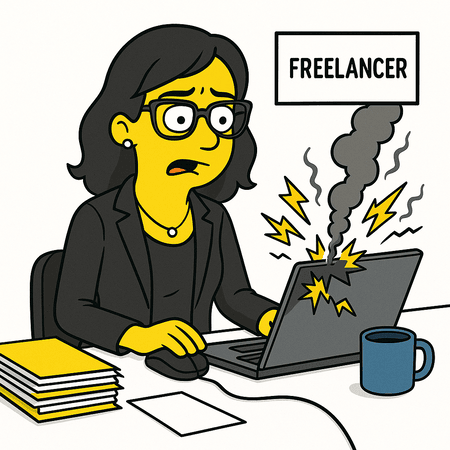September 5, 2025
Freelancer & Self-Employed Tax Guide – The Small Business Schedule Explained
If you’re a freelancer, sole trader, or self-employed, the Small Business Schedule (SBS) is your key to declaring income, claiming business expenses, and accessing tax concessions. With GoTax, you can finalise your return quickly, claim every tax deduction, and avoid costly ATO mistakes.
 The SBS Confusion
The SBS Confusion
Freelancers face a big question at tax time: Where does my business income go? You’ve got client payments, side hustle invoices, maybe even cash jobs. The ATO expects it all in the Small Business Schedule. Miss it, and tension rises — especially when you picture those ATO “please explain” letters.
The Freelancer Who Paid Too Much
One tradie didn’t track expenses. He lost thousands because he couldn’t claim fuel, tools, or phone costs. Another freelancer guessed deductions — only to get audited and forced to repay with penalties. That’s tax tragedy.
From Chaos to Clarity
Enter record-keeping. With tools like eCashbooks, receipts become photos, invoices become simple, and BAS practically does itself. Suddenly, the SBS isn’t scary — it’s just another checklist. That’s the freelancer’s shift from disorganised to in-control.
Refund in Hand
Picture this: your SBS filled, deductions maximised, refund confirmed. You’ve gone from tension to triumph — and you did it online in three easy steps with GoTax.
What Is the Small Business Schedule (SBS)?
The SBS is part of your individual tax return. It’s where you:
-
Report all your business income
-
Claim your business expenses
-
Access small business concessions (e.g. simplified depreciation, GST)
If you earn business income — even solo — the SBS applies to you.
Record Keeping: Your Refund’s Best Friend
Keep:
-
Invoices & receipts
-
Bank statements
-
Income & expense details
-
Vehicle logbooks (if claiming car expenses)
-
Asset purchase/sale records
Hang onto everything for 5 years.
Tip: Use eCashbooks to simplify — invoicing, GST, expenses, and reporting sorted in one mobile-friendly system.
Freelancer Dos & Don’ts
The Dos
-
Keep every invoice & receipt
-
Declare all income (cash jobs too)
-
Claim genuine business expenses (tools, travel, phone, internet)
-
Check small business concessions
The Don’ts
-
❌ Don’t mix business/personal expenses
-
❌ Don’t forget side hustles or online sales
-
❌ Don’t claim without proof
-
❌ Don’t ignore superannuation
-
❌ Don’t leave tax to the last minute
Gotax Online FAQs – Self-Employed Questions
Do I need an ABN to be self-employed?
Yes — an ABN is required for all sole traders and freelancers.
Self-employed Aussies must have an ABN to operate legally.
What if I have both a job and a side business?
You must declare both — salary/wages plus business income.
Salary and business income go in the one tax return.
Can I claim my laptop or phone?
Yes, but only the work portion. Keep records.
Laptops and phones are deductible if used for business.
How do I pay tax if self-employed?
You pay when finalising your return. High earners may be placed on PAYG instalments.
Self-employed tax is paid at year-end or via PAYG instalments.
Can I claim meals or coffee meetings?
Only if directly linked to earning income (e.g. meeting a client).
Meals are deductible only if tied to business activity.
Do I need a logbook for my car?
Yes, if you want to claim actual expenses. Otherwise, use cents-per-km (up to 5,000km).
A logbook is required for most car expense claims.
Can I claim home office costs?
Yes — power, internet, rent/mortgage share (but beware CGT impacts).
Home office costs are deductible if your home is your business base.
Do I need to register for GST?
Yes, if your turnover exceeds $75,000.
GST registration is compulsory over $75,000 income.
What if I made a loss?
You must report it. Losses may carry forward under certain rules.
Business losses can offset future profits if rules are met.
Can I claim super contributions?
Yes, and they’re deductible. The current cap is $30,000/year.
Personal super contributions are deductible for the self-employed.
Quick Checklist (Permanent)
- ABN Registered
- All Income Declared
- Business Expenses Claimed
- Home Office Costs Sorted
- Super Contributions Considered
- GST Registered (if earning $75,000+)
- eCashbooks in Use
- Bank Account Separated
- Receipts Saved Digitally or on Paper
- Records Kept for 5 Years
What Next?
Signup to GoTax and not only get your Tax return done, you can also ask as many questions as you like and get informed answers. You have access to the equivalent of a Tax Einstein — that is our very own D.e.r.e.k as well as the best credentialed Tax Accountants around.
Start here: https://www.gotax.com.au/freelancer-tax-return
Try the Gotax online Library
Disclaimer
Note that the information provided is general in nature and subject to change, please contact one of our Gotax professionals who can evaluate your circumstances and provide more accurate advice to your current situation.





Leave a Comment